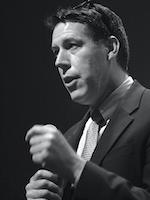Empowering Global Citizens through Digital History Day Projects
,
Colorado Convention Center, Bluebird Ballroom 3AB
Presenters


Session description
Purpose & objective
Although PBL adoption is increasing internationally, many educators need support and examples to make the shift from teacher-centered to student-centered learning. National History Day projects provide a ready-made but flexible framework for digital-age PBL in grades 6-12, along with a global community of practice for sharing effective strategies.
Despite the name, National History Day is more than a “day.” It’s an extended learning experience in which students frame their own questions for inquiry, produce final products of their choosing, and present them to authentic audiences. Each year, an estimated half a million students around the world take part in the project.
This session aims to inspire through compelling examples and challenge teachers to design similarly engaging experiences for their students. Co-presenter Terry Kaldhusdal, an award-winning middle school teacher and filmmaker, has had students investigate everything from the fight to fund public libraries to the legacy of Hammurabi’s Code to the use of postcards to communicate the terror of lynching. Whatever research question students choose, and whatever product they decide to produce to communicate their understanding, Kaldhusdal teaches them to consider the reliability of sources by asking: “What do I know? How do I know it? Why does it matter?” By teaching students to think as historians, he is preparing them to engage as citizens in democracy.
Co-presenter Suzie Boss, a PBL author and advocate, will offer additional examples from around the world to show how teachers can adapt projects to meet content goals and pursue interdisciplinary learning. Participants will learn how to get started with high-quality PBL, along with strategies for managing and assessing projects that offer students choice and voice.
Presenters will share resources to support teachers with the next steps in implementing their own projects.
Outline
CONTENT AND ACTIVITIES:
Award-winning teacher Terry Kaldhusdal will open the session with compelling project examples from his students’ participation in National History Day.
Co-presenter Suzie Boss will share additional examples from around the world, explaining how each project has addressed important learning goals and effectively integrated digital tools, reflecting best practices for PBL.
By unpacking the experiences that lead to polished final products, presenters will help participants identify the learning opportunities at each stage of PBL.
AGENDA AND PROCESS
ENTRY EVENT (15 min.): Inspirational examples from Terry’s students and additional examples from Suzie’s international research will help participants imagine what’s possible.
NEED-TO-KNOWS (5 min.): Modeling PBL practice, presenters will invite participants to share their questions on a digital whiteboard.
BUILDING UNDERSTANDING (30 min.): Presenters will respond to common questions about PBL by deconstructing projects to show the stages of learning, including the scaffolding, formative assessment, and reflection that lead to high-quality results.
Q&A and closing (10 min.)
Supporting research
A sizeable and growing body of research underscores key design elements for high-quality project-based learning and indicates positive and equitable student outcomes when projects are facilitated with attention to best practices. Many resources will inform our session, including books and articles written by and about the presenters. Supporting research includes:
Boss, S. (2023, fall). How PBL builds literacy across content areas. International Council of Teachers of English newsletter. https://www.icte-educators.org/_files/ugd/944bfa_7cbe186fe37649baae31dbf0630e50e9.pdf
Boss, S. (2023, Aug. 24). Setting up PBL for National History Day. Edutopia. https://www.edutopia.org/article/national-history-day-pbl (This article highlights strategies from teachers who are veterans of National History Day, including co-presenter Terry Kaldhusdal.)
Boss, S., & Krauss, J. (2018) Reinventing project-based learning: Your Field Guide to real-world projects for the digital age, 3rd ed. Eugene, OR: ISTE. (Note: Translation published in China.)
Boss, S., with Larmer, J. (2018). Project based teaching: How to create rigorous and engaging learning experiences. Alexandria, VA: ASCD. (Note: Translations published in Chinese, Spanish, Japanese, Arabic, South Korean.)
Jaquith, A., & Zilezinski, M. (2018, Nov. 21). Evaluating deeper learning: Retrospect and prospect. SCOPE Research Brief. Stanford, CA: Stanford Center for Opportunity Policy in Education. Download from https://hewlett.org/library/evaluating-deeper-learning-retrospect-and-prospect/
Larmer, J., Mergendoller, J., & Boss, S. (2015). Setting the standard for project based learning. Alexandria, VA: ASCD.
Kaufman, J., & Diliberti, M. (2023, May 23). Social studies achievement has plummeted nationally. Four reasons this trend will not be reversed without system action. The Rand Blog. https://www.rand.org/blog/2023/05/social-studies-achievement-has-plummeted-nationally.html
Terada, Y. (2021, Feb. 21). New research makes a powerful case for PBL. Edutopia. https://www.edutopia.org/article/new-research-makes-powerful-case-pbl
Session specifications
Laptop: Chromebook, Mac, PC
Tablet: Android, iOS, Windows
Learning Designer
- Collaborate with educators to develop authentic, active learning experiences that foster student agency, deepen content mastery and allow students to demonstrate their competency.
Citizen
- Create experiences for learners to make positive, socially responsible contributions and exhibit empathetic behavior online that build relationships and community.
- Design authentic learning activities that align with content area standards and use digital tools and resources to maximize active, deep learning.
 Return
Return Listen and learn: Edtalk
Listen and learn: Edtalk  Trips and Tours
Trips and Tours Streaming Session
Streaming Session Recorded Session
Recorded Session